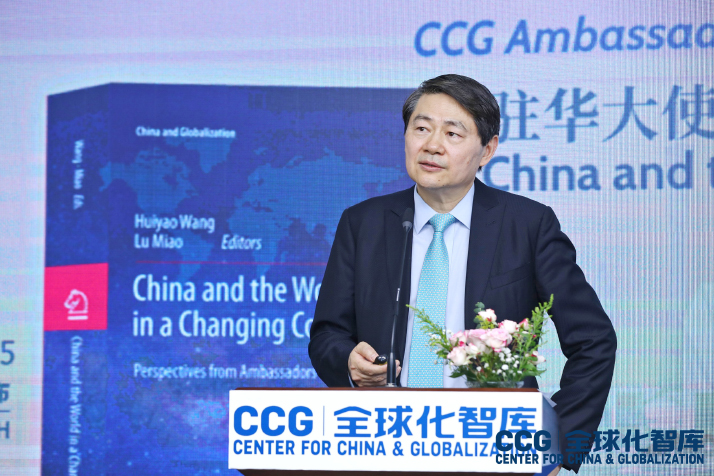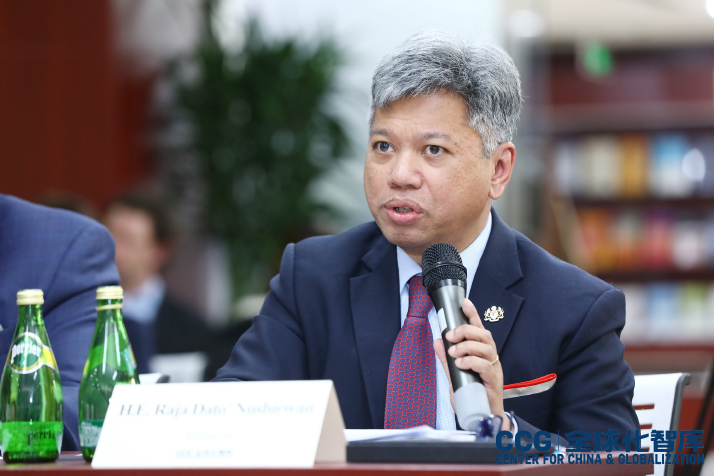| Voice |
| Keeping up with change | |
|
|
|
Some 40 foreign diplomats attended a launch ceremony for China and the World in a Changing Context: Perspectives From Ambassadors to China, hosted by the Center for China and Globalization (CCG) in Beijing on March 15. The book brings together observations on a range of bilateral and multilateral issues, including trade and investment, regional economic cooperation, sustainable development, technology and innovation, and entrepreneurship. Nineteen ambassadors to China and some international relations experts shared their insights during a round table discussion at the event. Edited excerpts of some statements follow:
 Wang Huiyao CCG President, editor of the book As China plays an increasing role in the global economy and global governance, its relations with other countries have become a subject of growing interest—and, at times, contention. Plugged into the politics of their home capitals, but also tasked with keeping a finger on the pulse of China and the world at large, ambassadors have a unique perspective on some of the major issues of our times, such as COVID-19, trends in the global economy, ongoing shifts in geopolitics, and the opportunities and challenges facing global governance. Their insights are useful not only for policymakers, but also for academics, businesspeople, students, and anyone hoping to make sense of our rapidly changing world. For some time, we have wanted to share these perspectives with a wider audience and contribute in some small way to opening up the conversation on China, globalization and other pressing topics of the times. This is why we have compiled this volume of original works by ambassadors to China from a wide range of countries. We hope to provide balanced and diverse perspectives on the world today.  Mohamed Elbadri Ambassador of Egypt We, ambassadors here in China, all know what China is. We all know that China is fine, developing at a very rapid rate, and I think we are all interested in learning from this model. However, the world is not. The world is ill. We have serious international problems that need to be addressed. Illness is not just about COVID-19. We're having problems relating to trade, problems relating to geopolitical uncertainties. The list is very, very long. The Egypt-China relationship is built on the concept of mutual respect, win-win cooperation, and non-interference in each other's affairs. We have had a very beneficial partnership. China was the first country to assist Egypt when it came to fighting COVID-19. They gave vaccines at a time when we really did not have any. No other country in the world was able to offer them to us. This is something we will never forget. At a time when we needed medical equipment to reduce death rates, China was there.  Daja Dato' Nushirwan Ambassador of Malaysia Globalization has brought humanity closer together. In such an environment, the human family must learn to adapt better to new realities. The West, which has been the dominant global force for the past 200 years, has lost its position. In 1970, the Group of Seven accounted for 50 percent of the global economy. This is expected to be 29 percent in 2026 and fall further afterward. The chaos in the early days of the pandemic demonstrates the structural problems of Western societies. The West must recognize that imposing its own points and values on others is no longer possible. China is an important force safeguarding world peace. This has been the assessment of Malaysia since the establishment of bilateral diplomatic relations in 1974. Since its reform and opening up [started in the late 1970s], China has remained an agent for global growth. It is an anchor for regional stability. It is trying to provide more global public goods. That's an inspiration for the developing world. We have dealt with China when it was strong; we have dealt with China when it was weak; we are dealing with China as it is reemerging right now. Whatever the case may be, it has been a generally productive and harmonious relationship. __________ In these times of economic turbulence and geopolitical change, it is important that we continue to invest in our relationship and join forces to deal with the challenges ahead, and climate change is the most important global challenge of our time. —Wim Geerts, Ambassador of the Netherlands Countries all around the world are now focusing increasingly on vocational education and training (VET). We all understand the need for highly skilled labor at all levels as our societies become more advanced and more digitalized. Finland carried out VET reform several years ago and China is going through a similar process. Finland has come a long way in making VET the preferred choice for many youngsters. Perhaps cooperation in VET can be the next success story in our active bilateral relations. The world is increasingly connected and global learning should be an integral part of VET as well. —Jarno Syrjälä, Ambassador of Finland Chinese authorities are seeking to create smart cities in an attempt to respond to the challenges posed by its rapid urban development, providing higher quality services as urbanization rates reach 60 percent. As a consequence, there are numerous market opportunities within the construction, transportation and logistics sectors. —Rafael Dezcallar de Mazarredo, Ambassador of Spain Furthermore, the new economic model of dual circulation in the Chinese economy will bring an added impetus to these trends, as consumption and imports will continue to expand, with expected benefits in the fresh and processed food sectors, as well as in the strengthening of existing value chains in the automotive, electronic, chemical, household appliances, construction materials, and metal processing sectors, among others. —José Luis Bernal, Ambassador of Mexico China as a consistent partner of Africa and its member states, plays a key role in supporting the empowerment of youth in Africa through the promotion of knowledge sharing, entrepreneurship, cultural and experiences exchanges. —Rahamtalla M. Osman Elnor, Permanent Representative of the African Union China has made great progress in the fight against poverty because its leaders have mobilized the nation around clear policies, resources, realistic goals, and strict discipline. China's experience in eradicating extreme poverty should serve as a reference for others. —Ahcène Boukhelfa, Ambassador of Algeria This provides the backdrop for the perspectives shared hereinafter on the important role of China as the emerging global economic prime mover, particularly in terms of the technical requirements and financial resources needed to fund the development initiatives of African countries in the context of the changing global political environment and global megatrends in the post-COVID-19 global economic reset. —Mbelwa Kairuki, Ambassador of Tanzania Looking into the digital potential of both countries, there is ample room for further cooperation and plenty of untapped opportunities ready to unfold. Indonesia and China are blessed with the same connectivity concepts as with the Global Maritime Fulcrum initiative and the Belt and Road Initiative, large populations and great market volume. In this regard, both countries should walk together and work in tandem to mutually explore cooperation in the digital economy sector. —Djauhari Oratmangun, Ambassador of Indonesia (Source: China and the World in a Changing Context: Perspectives From Ambassadors to China) Copyedited by G.P. Wilson Comments to ffli@cicgamericas.com |
|
||||||||||||||||||||||||||||
|